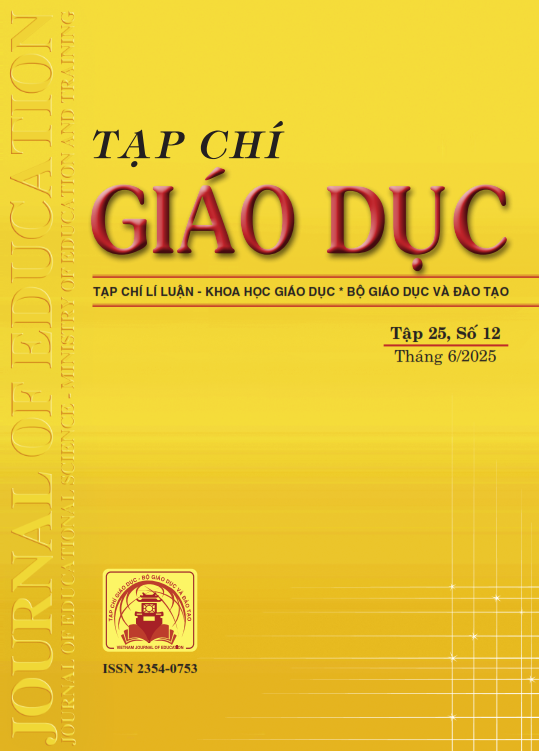Xây dựng bộ tiêu chí đánh giá năng lực giáo dục STEM của giáo viên trung học cơ sở
Tóm tắt
STEM education plays an important role in equipping students with the necessary skills for the 21st century; helping learners connect theoretical knowledge with practice through experiential activities and learning projects. This study focuses on developing a set of criteria to assess the STEM education competencies of secondary school teachers to meet the urgent demand for high quality STEM teachers in Vietnam. Applying the method of comprehensive document review, combining the Delphi technique through three rounds of expert consultation, the set of assessment criteria was built including 28 criteria, divided into 3 main groups of competencies: (1) Knowledge and understanding of STEM education; (2) Skills in delivering and organizing STEM teaching activities; (3) Professional qualities and ethical values in STEM education. The research results aim to bridge theoretical and practical gaps in assessing STEM education competency in Vietnam; thereby proposing specific applications of the criteria set in educational practice and future research directions.
Tài liệu tham khảo
Anderson, J., & Tully, D. (2020). Designing and Evaluating an Integrated STEM Professional Development Program for Secondary and Primary School Teachers in Australia. In book: Integrated Approaches to STEM Education (pp. 403-425). https://doi.org/10.1007/978-3-030-52229-2_22
Bộ GD-ĐT (2018). Chương trình giáo dục phổ thông - Chương trình tổng thể (ban hành kèm theo Thông tư số 32/2018/TT-BGDĐT ngày 26/12/2018 của Bộ trưởng Bộ GD-ĐT).
Bộ GD-ĐT (2019). Tập huấn cán bộ quản lí, giáo viên về xây dựng chủ đề giáo dục STEM trong giáo dục trung học.
Delbari, S. A., Ng, S. I., Aziz, Y. A., & Ho, J. A. (2016). An investigation of key competitiveness indicators and drivers of full-service airlines using Delphi and AHP techniques. Journal of Air Transport Management, 52, 23-34. https://doi.org/10.1016/j.jairtraman.2015.12.004
Duong, T. K. O. (2024). Integrated STEM education competence framework for university lecturers. European Journal of Educational Research, 14(1), 135-150. https://doi.org/10.12973/eu-jer.14.1.135
Kelley, T. R., & Knowles, J. G. (2016). A conceptual framework for integrated STEM education. International Journal of STEM Education, 3. https://doi.org/10.1186/s40594-016-0046-z
Nasri, N. M., Nasri, N., & Talib, M. A. A. (2020). Towards developing Malaysia STEM teacher standard: Early framework. Universal Journal of Educational Research, 8(7), 3077-3084. https://doi.org/10.13189/ujer.2020.080736
Nguyen, P. L. (2024). Vietnam’s STEM Education Landscape: Evolution, Challenges, and Policy Interventions. Vietnam Journal of Education, 8(2), 177-189. https://doi.org/10.52296/vje.2024.389
Nguyễn Quang Linh, Trần Phương Hà (2019). Giáo dục STEM trong chương trình giáo dục phổ thông mới. Tạp chí Khoa học và Công nghệ, Đại học Thái Nguyên, 206(13), 25-31.
Nguyễn Thành Hải (2022). Giáo dục STEM/STEAM: Từ trải nghiệm thực hành đến tư duy sáng tạo. NXB Trẻ.
Nguyễn Văn Biên, Tưởng Duy Hải, Trần Minh Đức, Nguyễn Văn Hạnh, Chu Cẩm Thơ, Nguyễn Anh Thuấn, Đoàn Văn Thược, Trần Bá Trình (2019). Giáo dục STEM trong nhà trường phổ thông. NXB Giáo dục Việt Nam.
Phạm Ngọc Sơn, Vũ Thị Thu Hoài, Võ Văn Duyên Em (2023). Năng lực giáo dục STEM của giáo viên dạy học môn Khoa học tự nhiên tại thành phố Hà Nội. Tạp chí Giáo dục, 23(số đặc biệt 8), 282-288.
Salami, A., M. K., Makela, C. J., & de Miranda, M. A. (2017). Assessing changes in teachers’ attitudes toward interdisciplinary STEM teaching. International Journal of Technology and Design Education, 27(1), 63-88. https://doi.org/10.1007/s10798-015-9341-0
Warner, L. A. (2014). Using the Delphi Technique to Achieve Consensus: A Tool for Guiding Extension Programs. EDIS, 2014(8). https://doi.org/10.32473/edis-wc183-2014
Tải xuống
Đã Xuất bản
Cách trích dẫn
Số
Chuyên mục
Giấy phép

Tác phẩm này được cấp phép theo Ghi nhận tác giả của Creative Commons Giấy phép quốc tế 4.0 .












